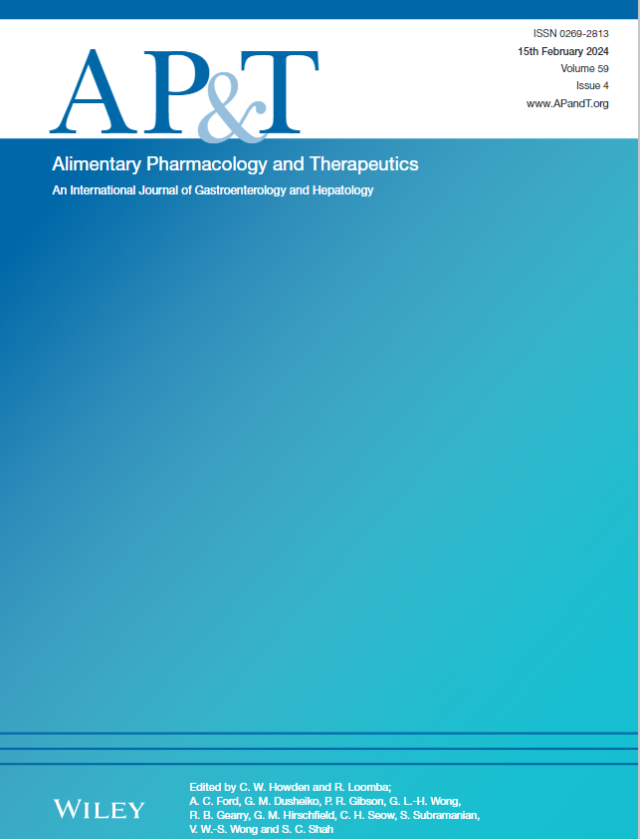炎症性肠病患者使用抗抑郁药的相关结果
IF 6.6
1区 医学
Q1 GASTROENTEROLOGY & HEPATOLOGY
引用次数: 0
摘要
虽然抑郁症在炎症性肠病(IBD)患者中很普遍,但治疗抑郁症的影响尚不清楚。方法:我们在基于电子健康记录的队列中进行了回顾性研究。我们使用≥2个诊断代码识别IBD患者,使用≥1个诊断代码识别抑郁症患者。这种暴露是一种治疗IBD的药物。我们评估了在抑郁代码索引日期或开始抑郁药物治疗后IBD相关的住院、手术和急诊室(ER)就诊情况。我们构建了多变量逻辑回归模型来确定结果的几率。结果我们确定了4052例IBD合并抑郁症患者,中位年龄为49岁。在这个队列中,39%的人没有接受抑郁症的药物治疗,61%的人接受了一种通常不用于治疗疼痛的抗抑郁药治疗。与未接受抑郁症治疗的IBD合并抑郁症患者相比,接受IBD相关ER就诊的可能性更低(aOR: 0.63, 95% CI: 0.44-0.90)。然而,接受抑郁症治疗的患者也更有可能住院(aOR: 1.40, 95% CI: 1.20-1.62)、接受皮质类固醇治疗(aOR: 1.34, 95% CI: 1.16-1.55)和接受IBD手术(aOR: 1.42, 95% CI: 1.17-1.71)。结论抗抑郁药的使用与IBD患者ER使用率的降低有关。住院治疗、皮质类固醇治疗和手术治疗也有所增加,这可能反映出与抑郁症相关的疾病病程更具侵略性。治疗IBD患者的抑郁症可以通过减少急诊室就诊来降低医疗费用。本文章由计算机程序翻译,如有差异,请以英文原文为准。
Outcomes Associated With Anti‐Depressant Use in Patients With Inflammatory Bowel Disease
BackgroundAlthough depression is prevalent among people with inflammatory bowel diseases (IBD), the impact of treating depression is unknown.MethodsWe conducted a retrospective study in an electronic‐health record‐based cohort. We identified patients with IBD using ≥ 2 diagnosis codes, and patients with depression using ≥ 1 diagnosis code. The exposure was a medication for the treatment of IBD. We assessed IBD‐related hospitalizations, surgery, and emergency room (ER) visits after the index date of depression code or initiation of depression medication. We constructed multivariable logistic regression models to determine the odds of the outcome.ResultsWe identified 4052 patients with IBD and depression with a median age of 49 years. In this cohort, 39% did not receive medication for depression while 61% were treated with an antidepressant not commonly prescribed for pain. Patients with IBD treated for depression were less likely to have an IBD‐related ER visit than patients with IBD and depression not treated for depression (aOR: 0.63, 95% CI: 0.44–0.90). However, patients who were treated for depression were also more likely to be hospitalised (aOR: 1.40, 95% CI: 1.20–1.62), be treated with a corticosteroid (aOR: 1.34, 95% CI: 1.16–1.55) and have surgery for IBD (aOR: 1.42, 95% CI: 1.17–1.71).ConclusionsAntidepressant use is associated with reduced ER utilisation in patients with IBD. There were also increased hospitalisations, corticosteroid treatment, and surgery, which may reflect a more aggressive disease course associated with depression. Treating depression in patients with IBD may reduce healthcare costs by decreasing ER visits.
求助全文
通过发布文献求助,成功后即可免费获取论文全文。
去求助
来源期刊
CiteScore
15.60
自引率
7.90%
发文量
527
审稿时长
3-6 weeks
期刊介绍:
Alimentary Pharmacology & Therapeutics is a global pharmacology journal focused on the impact of drugs on the human gastrointestinal and hepato-biliary systems. It covers a diverse range of topics, often with immediate clinical relevance to its readership.

 求助内容:
求助内容: 应助结果提醒方式:
应助结果提醒方式:


